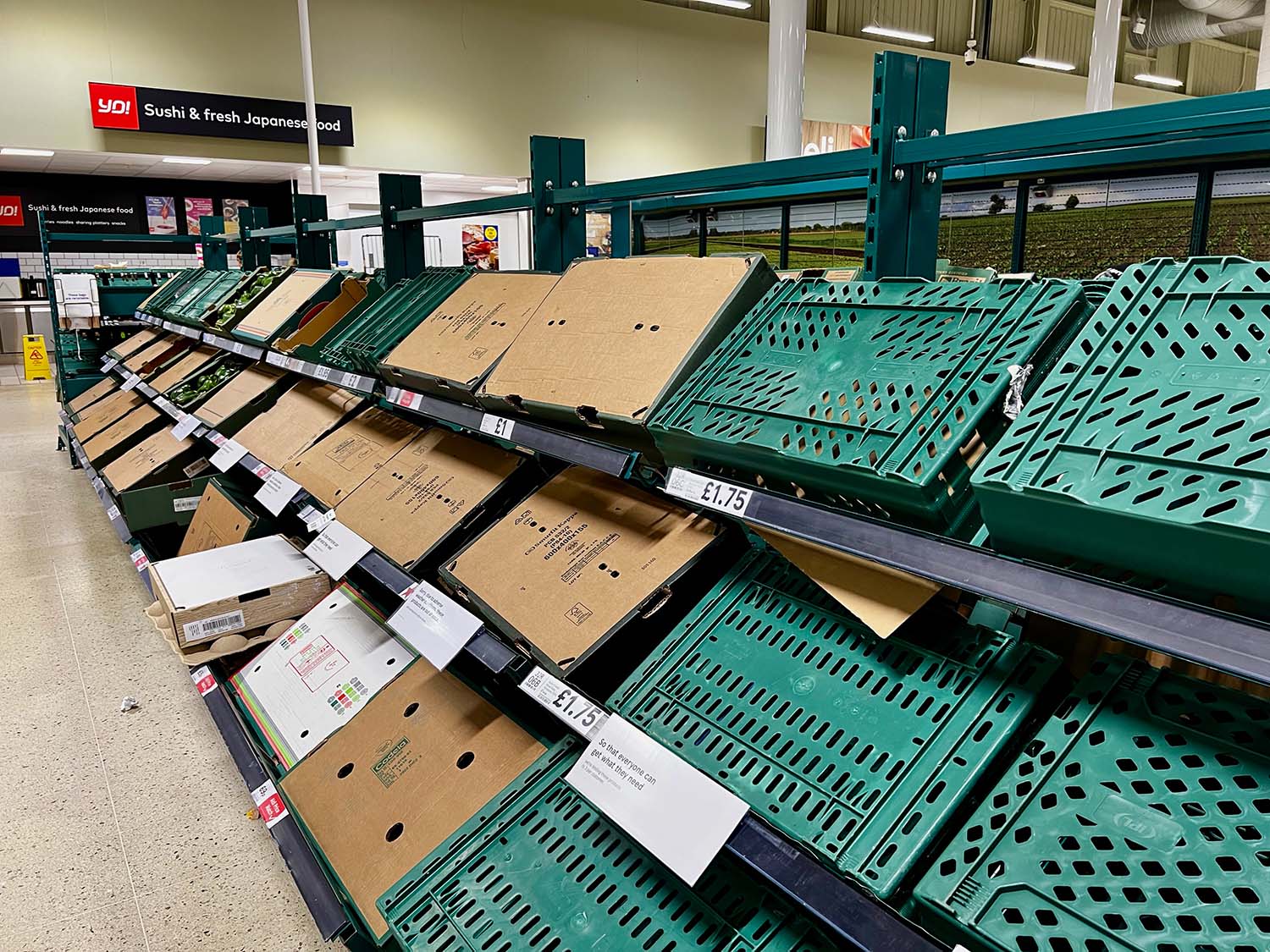Food shortages in the UK
Seasonal food refers to the times of the year when the harvest or the flavour of a given type of food is at its peak. This is usually the time when the item is harvested. Before supermarkets, most food eaten in the UK was sourced in the UK and seasonal. Fruit and vegetables were available according to the season. For example, during the summer months, lettuce and strawberries were widely available, whereas, during the winter, parsnips and cabbage were sold. Food was also preserved by being bottled, frozen and pickled.
Today, we are used to enjoying seasonal fruit and vegetables throughout the year. However, because some food cannot be grown throughout the year in the UK, it has to be imported from other countries, along with food that is not native to the UK, such as avocado and mango. Therefore, there has been an increase in food being imported into the UK.
According to the British Retail Consortium (BRC), a trade group, UK supermarkets import 95% of their tomatoes and 90% of their lettuce in December and typically import the same proportions in March.
Why is fresh food in the news?
Three big supermarkets in the UK have restricted how much fresh food people can buy, such as tomatoes, cucumbers, and peppers. This is because they want to ensure enough food for everyone and don’t want the shelves to be empty. We don’t know yet if other shops will also have restrictions or if there will be a shortage of other types of food.
How big is the problem?
Morrisons and Asda supermarkets in the UK have restricted how much fresh food people can buy. Morrisons says people can only buy two packs of tomatoes, cucumbers, lettuce and peppers, and Asda says people can only buy three packs of broccoli, cauliflower, raspberries, and lettuce. On Wednesday, Tesco and Aldi said people could only buy three packs of peppers, cucumbers, and tomatoes. Other supermarkets haven’t said anything yet, but some people think there might not be enough food for a few weeks.
What is behind the shortages?
Getting fresh fruits and veggies in the UK is becoming harder because of two problems. First, the weather in Europe and North Africa has been bad, so there isn’t as much food to import. Second, it costs more for UK and Dutch farmers to grow their crops in greenhouses because of higher energy bills, and they planted less food this winter. This means there’s not as much food in the UK, and stores have to rely more on getting food from Spain and north Africa, which were also hit by bad weather. This has led to a shortage of some types of fresh food.
Are things worse in the UK than the rest of Europe?
It seems like France and Germany aren’t having the same problems as the UK when it comes to getting enough food. There’s not as much fresh food in the UK because the weather hasn’t been good, and British farmers aren’t producing as much as usual. This means there’s not enough food, and stores have to ration how much people can buy. The National Farmers’ Union president says there might be even more rationing if the farmers have to pay high energy bills. Some farmers also waited to plant their crops because they weren’t sure it was a good idea with all the problems. It will take a few weeks before the UK can make enough food to fill in the gap. This means stores have to buy food from Spain and Morocco, but there’s not enough to go around, so stores might not have as much food as they need and might have to pay more for it.
So is Brexit to blame?
Many farmers and suppliers don’t think that the UK leaving the EU is the only reason why there’s not enough food in stores. However, some farmers say that Brexit and the pandemic have made things harder because they have to pay their workers more because there aren’t enough. Some people who bring food into the UK from other countries say that Brexit has made it harder to get it here on time because of more paperwork and higher costs. This is especially difficult for food that goes bad quickly and must be moved quickly.
What other food stuffs might run short?
Salad foods like cucumbers, tomatoes, and lettuce are hard to find now. It’s also tough to get aubergines, lemons, broccoli, and lettuce from Spain. In the UK, frost damaged crops like cabbage and cauliflower. But that’s not all. There’s also a shortage of eggs because of a bad bird flu outbreak. All the birds must be kept inside, making it expensive to keep them warm and lit. So, there aren’t as many eggs being made in the UK as usual. One big supermarket, Sainsbury’s, has had to get eggs from Italy because there aren’t enough in the UK.
What could be done to help the situation?
The National Farmers Union wants the government to help British farmers who rely on energy. The president, Minette Batters, thinks it’s unfair that botanical gardens with large glasshouses get help with their energy bills, but food producers with greenhouses don’t. The farming minister, Mark Spencer, says the government is looking into this.
Even though salad crop prices are increasing, farmers might not make more money because they have contracts with supermarkets and suppliers that set prices. Some farmers are upset because supermarkets sell food too cheaply, below its cost. But supermarkets don’t want to raise prices too much and lose customers during the cost of living crisis.




Leave a Reply
Want to join the discussion?Feel free to contribute!